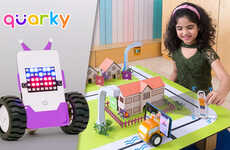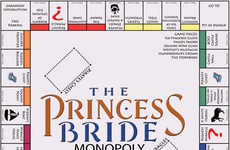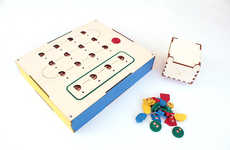
Robot Turtles Teaches Young Kids to Think Like Coders
Michael Hines — September 30, 2013 — Life-Stages
References: kickstarter & dvice
Robot Turtles is a new board game that is meant to get children into programming at a young age. It was created by Dan Shapiro, a programmer from Seattle, Washington. The game doesn't teach kids a certain programming language per se, but it does teach them to think like a computer programmer would think. The game does this by breaking down coding into its simplest forms.
The game is meant to be played by kids ages three to eight and one adult. It's the kids (the programmers) job to draw the cards and make the decisions while the adult (the computer) executes their commands. By using turtles, lasers and mazes, Robot Turtles subtly teaches kids how to plan ahead, follow an order of operations and even de bug. Kids can shout "bug" to de bug a wrong move on the board. Shapiro took Robot Turtles to Kickstarter, seeking $25,000 in funding and ended up with over $500,000 in support, making the game the most-funded tabletop game in Kickstarter history.
The game is meant to be played by kids ages three to eight and one adult. It's the kids (the programmers) job to draw the cards and make the decisions while the adult (the computer) executes their commands. By using turtles, lasers and mazes, Robot Turtles subtly teaches kids how to plan ahead, follow an order of operations and even de bug. Kids can shout "bug" to de bug a wrong move on the board. Shapiro took Robot Turtles to Kickstarter, seeking $25,000 in funding and ended up with over $500,000 in support, making the game the most-funded tabletop game in Kickstarter history.
Trend Themes
1. Programming Board Games - Creating new board games to teach kids programming at a young age, with opportunities to teach kids to plan ahead, follow an order of operations, de bug and learn to think like a computer programmer.
2. Gamification of Learning - Gamifying learning experiences through board games to enhance engagement and encourage children to learn important skills.
3. Simplification of Coding Concepts - Breaking down complex coding concepts into their simplest forms to teach kids programming through fun activities.
Industry Implications
1. Toy and Board Games Industry - Developing new board games and toys that teach children important skills such as programming and encourage learning through fun activities.
2. Education Industry - Incorporating gamification and interactive activities into the classroom to enhance engagement and encourage children to learn important skills such as programming.
3. Technology Industry - Developing new tools and resources that teach children programming at a young age, potentially creating a new pipeline of future programmers and coders.
1.7
Score
Popularity
Activity
Freshness















